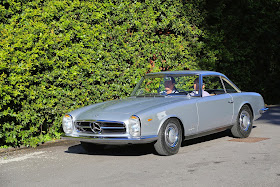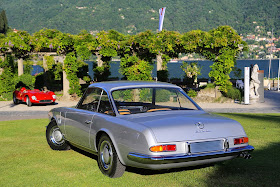Since its debut at the at the 1963 Geneva Motor Show, the Mercedes-Benz 230 SL, a new sports car to replace its two predecessors, the 190 SL (W 121) and 300 SL (W 198), were extremely popular and successful from the start. The 230 SL, internally designated as W 113 series, held the balance between the sporty tuning of a classic roadster but added to them the comfort of a two-seater touring car featuring high performance and the most advanced features for optimum driving safety.
The 230 SL was available from summer 1963 in three versions: an open-top car with a folding soft top that could be operated with the greatest of ease; an open-top version with hardtop, and finally as hardtop coupé. The hardtop coupé had no soft top and soft-top compartment, but more room for luggage instead. The 230 SL Coupe is today universally known and loved for its concave roof, which earned it the nickname 'Pagoda'. The “Pagoda” was the first SL in which sporty speed combined with safety as a design objective.
In order to provide an altogether more exclusive option, Mercedes-Benz commissioned Italian carrozzeria Pininfarina to create a design for the 230 SL Coupe of their own, while retaining enough of the original lines to make the instantly recognisable. The young American designer Tom Tjaarda was awarded the assignment. While the nose was pretty much carried over from the production SL, subtle changes were made to the grille like angling the Mercedes-Benz star forward slightly. The greenhouse was all new and featured much slimmer panels and a conventional roof. The crease along the side of the car dropped down at the rear, where the brief allowed more creative freedom. The tail was much more compact on than on the 230 SL and featured relatively small taillights. Chrome trim was used throughout but with considerable restraint.
Mercedes-Benz had stipulated that the interior could not be touched and naturally the chassis was also carried over without modifications. The 'M127' straight six cylinder displaced just over 2.3 litre and featured a single overhead camshaft. Equipped with the latest fuel injection system, it produced around 150 bhp. For reasons unknown, it was not followed up by a small production run. (ultimatecarpage.com & supercars.net)
The 230 SL was available from summer 1963 in three versions: an open-top car with a folding soft top that could be operated with the greatest of ease; an open-top version with hardtop, and finally as hardtop coupé. The hardtop coupé had no soft top and soft-top compartment, but more room for luggage instead. The 230 SL Coupe is today universally known and loved for its concave roof, which earned it the nickname 'Pagoda'. The “Pagoda” was the first SL in which sporty speed combined with safety as a design objective.
In order to provide an altogether more exclusive option, Mercedes-Benz commissioned Italian carrozzeria Pininfarina to create a design for the 230 SL Coupe of their own, while retaining enough of the original lines to make the instantly recognisable. The young American designer Tom Tjaarda was awarded the assignment. While the nose was pretty much carried over from the production SL, subtle changes were made to the grille like angling the Mercedes-Benz star forward slightly. The greenhouse was all new and featured much slimmer panels and a conventional roof. The crease along the side of the car dropped down at the rear, where the brief allowed more creative freedom. The tail was much more compact on than on the 230 SL and featured relatively small taillights. Chrome trim was used throughout but with considerable restraint.
Mercedes-Benz had stipulated that the interior could not be touched and naturally the chassis was also carried over without modifications. The 'M127' straight six cylinder displaced just over 2.3 litre and featured a single overhead camshaft. Equipped with the latest fuel injection system, it produced around 150 bhp. For reasons unknown, it was not followed up by a small production run. (ultimatecarpage.com & supercars.net)
The unique show car was eventually sold to a German newspaper magnate before being sold to the United States. Not seen in public for many years, it eventually re-appeared during the 1990s. By that time it was finished in red, while it had at one point also sported a black paintscheme. The new custodians meticulously restored the one-off to its original silver livery. (ultimatecarpage.com)
The factory version of the Mercedes-Benz 230 SL Coupe (1963-67)
(Photos from conceptcarz.com, ultimatecarpage.com, supercars.net, autowp.ru)







.jpg)

.jpg)
.jpg)
.jpg)
.jpg)




.jpg)
.jpg)
.jpg)


.jpg)



.jpg)
.jpg)
.jpg)




















